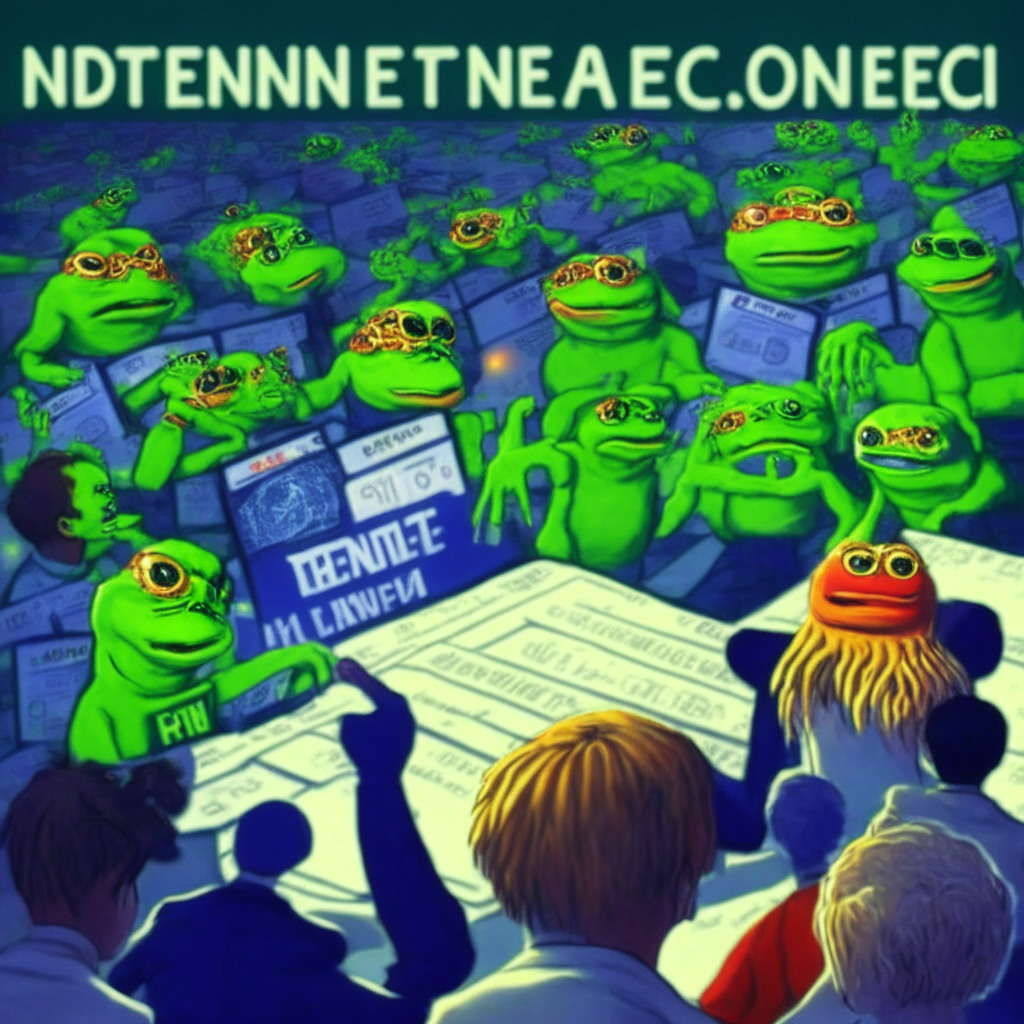The recent 5% drop in Bitcoin’s price raises concerns about market stability and the crucial $24,000 support level. This follows a hawkish statement from the Federal Reserve and a turbulent week for cryptocurrencies, with the next support level at $24,350.
Search Results for: Ron DeSantis
Crypto in the 2024 US Presidential Race: Analyzing Francis Suarez’s Candidacy and Challenges
Pro-Bitcoin candidate Francis Suarez has entered the 2024 US presidential race, stirring buzz within the crypto community. While the Miami mayor’s pro-crypto stance excites enthusiasts, regulatory scrutiny around digital currencies raises questions about the feasibility of his policies.
Balancing Privacy and Efficiency in Retail CBDCs: Pros, Cons, and Conflicts
U.S. Treasury official Graham Steele highlighted the importance of privacy and anonymity in developing a potential retail Central Bank Digital Currency (CBDC) and suggested that Privacy Enhancing Technologies be considered for preserving user anonymity. Steele also discussed pros, cons, and challenges, including minimizing illegal transactions and ensuring privacy.
Will Democrats Lose Young Crypto Voters? Analyzing the Winklevoss Claims and the Political Divide
The Winklevoss twins suggest that the Democratic Party’s perceived “war on crypto” could cost them key young voters in upcoming elections. Young people, who largely supported Democrats previously, make up a significant portion of cryptocurrency adopters. It remains uncertain how important crypto policy is to young voters compared to other issues.
Crypto Wars: Democrats Risk Alienating Youth Voters with Anti-Crypto Stance
Crypto billionaire Cameron Winklevoss warns that the war on cryptocurrencies led by U.S. Senator Elizabeth Warren and SEC Head Gary Gensler could alienate Millennials and Gen Z, potentially impacting Democratic voter support. Not all Democrats share anti-crypto sentiment, as the debate around regulations continues to shape the political landscape.
Bitcoin Volatility and Stablecoins: Navigating Market Sentiments and Regulation
The price of Bitcoin has declined by 4.50% over the last week, emphasizing its volatility and sensitivity to market sentiment. Amid concerns about the US dollar’s reserve currency status, Binance CEO Changpeng Zhao believes dollar-based stablecoins could strengthen the dollar; however, he criticized the US regulatory framework for cryptocurrencies. The future of cryptocurrencies appears to be influenced by various factors, including regulatory developments and the potential impact of stablecoins.
Elon Musk Invites Pro-Bitcoin Candidate RFK Jr. to Twitter Spaces: A Crypto-Politics Collision
Elon Musk invites 2024 presidential candidate and Bitcoin supporter Robert F. Kennedy Jr. for a Twitter Spaces interview, raising intrigue on crypto and politics discussions. Kennedy’s opposition to CBDCs and concerns over government control align with Musk’s crypto affinities.
Crypto Market Swings, Political Factors, and the Search for the Next Defining Narrative
The crypto market faces unpredictable price swings as experts suggest the upcoming US election could shape the next narrative for cryptocurrencies. With Central Bank Digital Currencies gaining importance in politics and asset managers holding long positions on crypto, the market continues to evolve amidst varying factors influencing future price action.
Stablecoins, Politics, and Regulations: Navigating the Crypto Market’s Calm Before the Storm
The cryptocurrency market experienced a flat week, with Bitcoin and Ethereum remaining stable. Meanwhile, ICP and LDO faced losses, while TRON rallied. The growing crypto market attracts political involvement, and regulatory bodies emphasize the need for clear guidelines and vigilance.
Polarization of Crypto Debate: Finding Common Ground for Progress and Innovation
The crypto debate in the U.S. has become polarized and politicized, hindering technical discussions on policy and technology. Social media fuels the issue, promoting fear-mongering and limiting productive conversations. A constructive, open-minded approach to discussions is essential for progress and understanding the potential of cryptocurrencies.
Bitcoin’s Resilience Amid Debt Ceiling Talks and Evolving Crypto Regulations
Bitcoin experiences a significant rebound, reaching the 38.2% Fibonacci retracement level, as it recovers from a recent pullback. Market dynamics such as US debt ceiling talks and ongoing cryptocurrency regulations impact the BTC/USD value, with caution advised amid mixed technical signals.
AI in Political Advertising: Balancing Innovation, Ethics, and Integrity
AI’s growing entry into political advertising raises concerns about ethics and transparency. While AI-generated content can create captivating visuals, it also poses risks of misinformation and erosion of trust in political communication. Striking the right balance between innovation and integrity is crucial as AI’s role in political advertising evolves.
2024 Presidential Race: Bitcoin Knowledge as a Decisive Factor in Candidate Popularity
In the 2024 U.S. presidential race, biotech entrepreneur Vivek Ramaswamy positions himself as the candidate with the deepest understanding of Bitcoin, supporting it as a decentralized alternative to the U.S dollar and planning regulatory overhauls. His cryptocurrency knowledge may attract tech-savvy voters.
Election-Themed Crypto Coins: High Gains or Scam Traps for Newcomers? Pros, Cons & Red Flags
Cryptocurrency markets have recently witnessed the emergence of new US election-themed coins, some with potential scam elements. Investors should exercise caution and stay informed, as not all newly launched projects are dubious. Thorough evaluations help identify high growth potential coins in the ever-changing crypto landscape.
Election-Themed Tokens: Fascination Meets Risk in Crypto’s Political Playground
The rise in popularity of political-themed tokens highlights the public’s fascination with politics and finance. However, potential risks involved with such tokens should not be ignored. Crypto enthusiasts must diligently examine reliability, liquidity, and other technical aspects to ensure maximum safety and profitability in their investments.
Bipartisan Battle Against CBDCs: Financial Privacy vs Global Adoption in 2023
US lawmakers introduced a bipartisan bill aimed at preventing the Federal Reserve from issuing a central bank digital currency (CBDC), citing concerns over financial privacy and surveillance. Despite opposition, global interest in CBDCs remains strong, with various countries planning pilot testing in 2023.
Ripple’s CBDC Platform: Revolutionizing Finance or Threatening Privacy? The Great Debate
Ripple unveils a new CBDC platform, designed to assist central banks and financial institutions in creating and managing their own central bank digital currencies. This reflects growing global interest but also highlights ongoing debates on potential benefits and risks surrounding the adoption of CBDCs.
Stablecoin Regulation Debate: US Lawmakers’ Divide and the Future of Digital Dollar
The US House Financial Services Committee’s digital assets panel debated on stablecoin regulations, highlighting divides between Republican and Democratic ideas. Both parties do align in addressing risks to consumers and maintaining the US dollar’s role in global commerce. Lawmakers are paying heightened attention to stablecoin regulations and wider crypto topics, marking progress in US oversight of the industry.
U.S. States Battle Over CBDCs: Privacy Fears, Rising Tension, and a Divided Future
Florida recently banned central bank digital currencies (CBDCs), sparking interest from states such as Louisiana, Alabama, Texas, and North Dakota who also drafted opposition bills. Privacy concerns, government control, and individual freedom are key factors contributing to the contentious debate on CBDCs in the US.
Crypto’s Role in Presidential Debates: Political Divide and Future Implications
As the political atmosphere heats up, the conversation around cryptocurrency gains momentum, with its potential influence on voters becoming a topic at the presidential debate stage. The crypto market’s rapid growth and its impact on younger, tech-savvy generations have made it an essential topic for both political parties.
Samsung and Bank of Korea: Pioneering Offline CBDC Technology and its Implications
Samsung Electronics partners with the Bank of Korea to conduct research and develop an ecosystem for a Central Bank Digital Currency (CBDC). They aim to collaborate in the offline payment sector and expand the global growth of offline CBDC technology, enabling secure and device-to-device transactions through near-field communication.
Pepe Meme Controversy Triggers Coinbase Boycott, Florida’s CBDC Restrictions, and Scam Alerts
An email controversy involving Coinbase and Pepe the Frog meme has led to backlash and apology from the platform’s chief legal officer. Meanwhile, Florida restricts central bank digital currencies use, and Kraken crypto exchange uses “scam baiting” to flag malicious wallets. Caution is urged in the volatile Pepe memecoin market.
Biden’s Federal Reserve Nominations: How They Could Shape the US Crypto Future and CBDC Debate
President Joe Biden nominates economist Philip Jefferson and former chief economist Adriana Kugler for critical roles in the Federal Reserve, impacting the U.S. government’s approach to cryptocurrencies, blockchain technology, and the potential introduction of a central bank digital currency (CBDC).
FedNow and Metal Blockchain Integration: Stablecoins, Privacy, and Financial Future Debated
The Federal Reserve’s upcoming integration with Metal Blockchain has sparked debates on stablecoins, privacy, and financial system plans. Metal Blockchain’s collaboration with instant payment service FedNow aims to enable rapid stablecoin conversions and potentially create interconnected “bank chains” for a secure, oracle-independent blockchain ecosystem.
Unlocking the Potential of Offline CBDCs: Balancing Privacy, Security, and Financial Inclusion
The BIS Innovation Hub has published a handbook to assist central banks in implementing offline CBDC technology, aiming to advise on security measures, risks, privacy considerations, and resilience options. The guide highlights the potential benefits of enabling offline use for CBDCs in achieving public policy objectives aligned with central banks’ mandates.
Biden’s Crypto Tax Proposals: Balancing Innovation vs. Financial Fairness Debate
As President Biden proposes tax code updates for crypto assets in his fiscal year 2024 budget, critics argue that the U.S. should support the growing technological and financial revolution of cryptocurrency. Meanwhile, concerns over unclear regulatory guidance and a proposed 30% excise tax on crypto miners’ energy consumption intensify the debate on cryptocurrency regulation and innovation support.
Crypto Market Stagnation: Fed Rate Hikes, DAME Tax Resistance, and Political Debates
The crypto market’s recent stagnation is due to factors like Federal Reserve’s interest rate hikes, regulatory developments such as the proposed Digital Asset Mining Energy tax, and politicians voicing concerns about cryptocurrencies. Despite this, cryptocurrencies gain widespread attention and face increasing regulation as debates on growth, energy consumption, and political implications continue.
Meme Coins Rise, Crypto Giants Fall: Mixed Market Signals and the Brewing CBDC Political Storm
As the crypto market experiences mixed signals with meme coins surging and crypto giants faltering, political debates over Central Bank Digital Currencies (CBDCs) intensify. Florida and North Carolina vote to ban CBDCs, raising concerns about state-chartered banks’ autonomy and potential federal government overreach in money regulation.
Balancing CBDC Progress: Privacy Concerns vs. Blockchain Innovation and Financial Inclusion
North Carolina’s House of Representatives unanimously voted in favor of a bill prohibiting state’s government entities from accepting CBDCs, raising questions on embracing or restricting such currencies. CBDCs face debates on privacy, governmental control, and improved transaction speed, financial inclusion, and security compared to decentralized cryptocurrencies.
Florida’s CBDC Ban Sets Stage for National Debate: How It Could Shape Crypto Industry’s Future
Regulatory developments impact the future of central bank digital currencies (CBDCs), with Florida’s recent ban revealing the evolving legislative landscape. Over 100 countries are researching CBDCs, which aim to digitize fiat currencies but face concerns regarding privacy and financial inclusion. Balancing potential benefits and risks before implementing laws is crucial for the growth of the crypto industry.
Florida’s Anti-CBDC Law: Protecting Privacy or Hindering Progress? Debating Pros and Cons
Florida’s anti-CBDC legislation, SB 7054, explicitly prohibits the use of central bank digital currencies as a digital medium of exchange, aiming to protect Floridians’ financial privacy. Set to come into effect on July 1, 2023, this legislation highlights growing concerns over potential privacy and political repercussions linked to CBDCs.
CBDCs: Political Hot Potato or Wave of the Future? Debating the Pros and Cons
Central bank digital currencies (CBDCs) have sparked political debates, with critics arguing they could lead to surveillance and control of citizen transactions. Over 100 countries are developing CBDCs, and the ongoing debate could impact research and development, potentially limiting the sharing of results.































